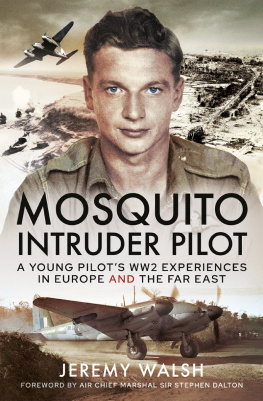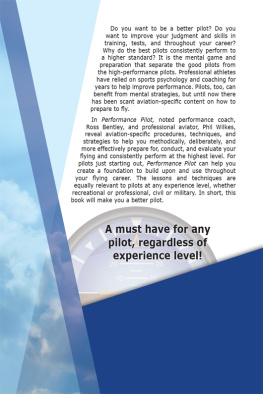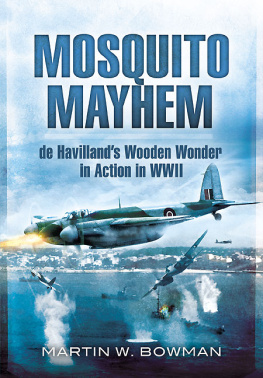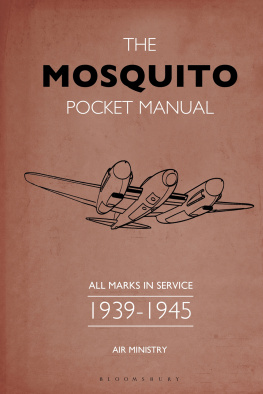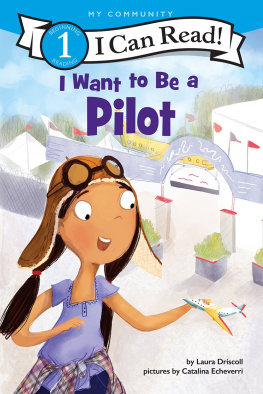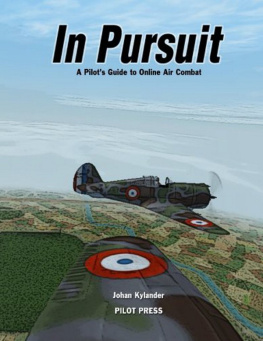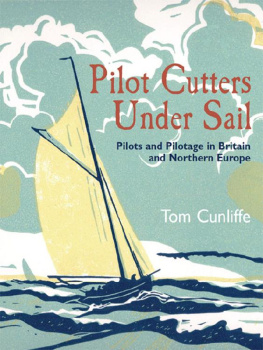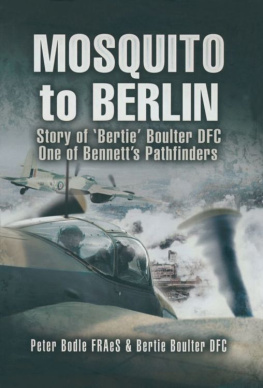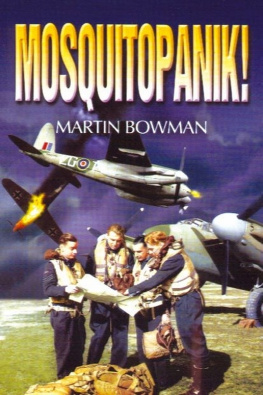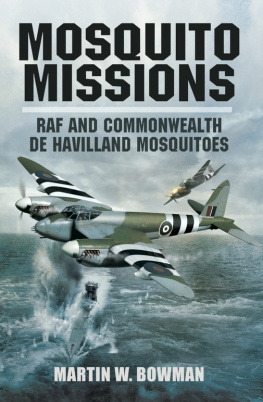Pagebreaks of the print version

MOSQUITO
INTRUDER
PILOT
A Young Pilots WW2 Experiences in
Europe and the Far East
For Toby, Louis and Imogen
To know more about one of your great-grandfathers
MOSQUITO INTRUDER PILOT
A Young Pilots WW2 Experiences in Europe and the Far East
Joining the RAF straight from school in early 1941, Ben Walsh
volunteered to fly as an Intruder, at low-level over enemy territory, alone
and in the dark. This is his story.
JEREMY WALSH
With Foreword By
Air Chief Marshal Sir Stephen Dalton
MOSQUITO INTRUDER PILOT
A Young Pilots WW2 Experiences in Europe and the Far East
First published in Great Britain in 2022 by
Air World
An imprint of
Pen & Sword Books Ltd
Yorkshire Philadelphia
Copyright Jeremy Walsh, 2022
ISBN 978 1 39908 477 2
eISBN 978 1 39908 478 9
Mobi ISBN 978 1 39908 478 9
The right of Jeremy Walsh to be identified as Author of this work has been asserted by him in accordance with the Copyright, Designs and Patents Act 1988.
A CIP catalogue record for this book is available from the British Library.
All rights reserved. No part of this book may be reproduced or transmitted in any form or by any means, electronic or mechanical including photocopying, recording or by any information storage and retrieval system, without permission from the Publisher in writing.
Pen & Sword Books Limited incorporates the imprints of Atlas, Archaeology, Aviation, Discovery, Family History, Fiction, History, Maritime, Military, Military Classics, Politics, Select, Transport, True Crime, Air World, Frontline Publishing, Leo Cooper, Remember When, Seaforth Publishing, The Praetorian Press, Wharncliffe Local History, Wharncliffe Transport, Wharncliffe True Crime and White Owl.
For a complete list of Pen & Sword titles please contact
PEN & SWORD BOOKS LIMITED
47 Church Street, Barnsley, South Yorkshire, S70 2AS, England
E-mail:
Website: www.pen-and-sword.co.uk
Or
PEN AND SWORD BOOKS
1950 Lawrence Rd, Havertown, PA 19083, USA
E-mail:
Website: www.penandswordbooks.com
FOREWORD
By
Air Chief Marshal Sir Stephen Dalton
GCB LLD(Hon) DSc(Hon) BSc FRAeS CCMI
Every military pilot will have his or her favourite aircraft. For Royal Air Force pilots, the Spitfire, Hurricane, Hunter, Lightning, Vulcan or Typhoon are probably high on their list, but there can be few aircraft whose name conjures up the same sense of awe, wonder and respect as that of the Mosquito. For many, Operation Jericho, in which Group Captain Charles Pickard DSO and Two Bars, DFC led the famous raid on Amiens Prison in February 1944, epitomises the qualities of this magnificent aircraft. Whilst the Mosquito is most famous for operations in Europe, it also saw service in a variety of roles in South-East Asia during the Second World War; however, the relatively lightweight laminated wooden structure of the aircraft, that was at the heart of its speed and range performance, suffered from some significant technical problems in the particular conditions of the region. All too often, such problems tragically lead to loss of life, which in wartime is accepted, because the urgency of the moment and the very survival of nations depends on the ability and willingness of its military to accept such losses and fight on. What is rarely recorded in history is the impact on those closest to those who go missing in action or are killed in accidents, the cause of which could undermine others confidence in vital equipment or their military leaders.
In this factual account of the life of Ben Walsh, who saw operations at a very young age as a wartime Mosquito pilot, we read about the reality of his life, the highs, the lows and the fight to cope with the natural anxiety and fears of seeing friends not return from routine (wartime) missions. We also read of the (historic) challenges in diagnosing and caring for warriors who hide their personal feelings and normal human reactions to the death of comrades and peers. They do this partly because they think it is their duty to cope with the emotional strain without showing it and partly because they must get on with fighting the war. It was my great honour to know Squadron Leader Geoffrey Welham DFC, who was the youngest Royal Air Force fighter pilot to have flown in the Battle of Britain. Like Ben, he saw many of his close comrades shot down during that battle and subsequently, wrote one of the most gripping stories about his wartime experiences entitled First Light . He was very open and honest about his mental deterioration as a consequence of those experiences and of his subsequent breakdown. Today, as a result of the greater understanding and evaluation of the impact on military personnel of their own experiences and the loss of comrades in recent military operations and conflicts, we have learned much more about the mental consequences of hiding these normal human feelings and, as a society, we are more able to accept these normal feelings and to help combatants overcome their mental anxieties.
In this book, Jeremy primarily tells the story of his fathers wartime experience and, in so doing, he not only portrays a powerful example of what drives military people to go on in some of the most demanding situations, but also highlights the price that many pay both during and after their combat experience. Such stories tell of normal human reaction to devastating events and they deserve to be told and read. Wonderful aircraft are the critical tool of any air force, but the people who fly them, and those who service and support them, give them life and they deserve our understanding and compassion both during operations and potentially for a long time after the combat phase ends.
ACKNOWLEDGEMENTS
As with any research project, I have received significant help and support along the way.
Firstly, I must thank Lynn Ashburner. When my father started to show the early signs of dementia in 2004, my sister Jacqui asked Lynn to sit down with him and document his war years. This was both to ensure that we knew what had happened to him and also as therapy for him, to stimulate his memory. Lynn wrote up these memories as a family booklet, which I have used as a key source, primarily for many of my fathers direct quotes.
I must also thank my wife, Fiona, for proof-reading and being very patient as I discussed the minutiae of my fathers military experiences. My brother-in-law, Alan Brown, a retired Colonel, also gave his time to both proof-reading and providing additional military perspective. My cousin Patricia Gradwell, Winnies (Bens sister) elder daughter, provided some letters from both Ben and Bens mother.
Jim Wiggle deserves my special thanks. We have been the closest of friends since 1973 when we were both in the RAF, sharing a flat at Bristol University. We were some of the last RAF pilots to be trained by instructors who had flown in the Second World War. Jim saw operational experience in the Falklands, Bosnia and Iraq. He has used his aviation experience and inquisitive mind to lend fresh perspectives with which to view some of my fathers experiences.

